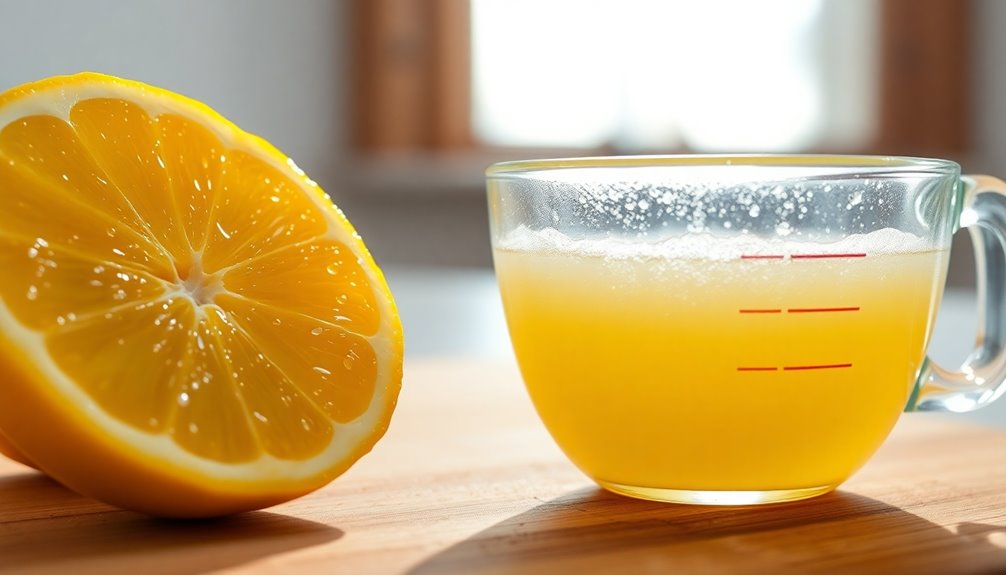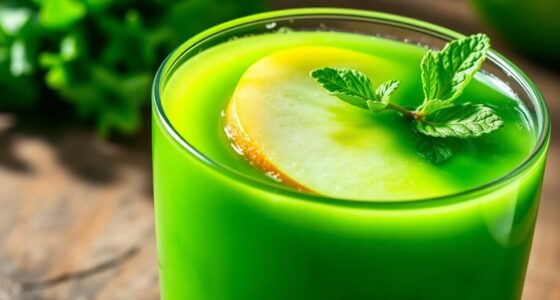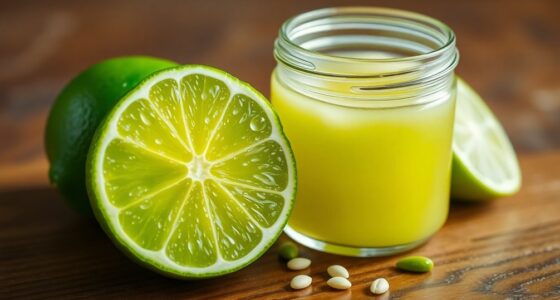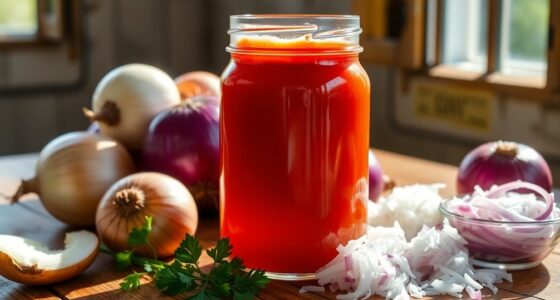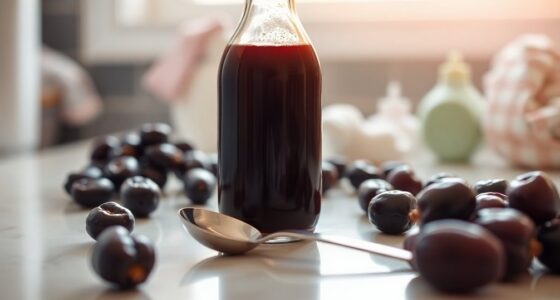Half a medium lemon usually gives you about 1.5 tablespoons of juice, while half a large lemon provides around 2 tablespoons. Keep in mind that the exact amount can vary depending on the lemon's size and ripeness. If you're worried about running short on juice, it's a good idea to have an extra lemon on hand. Knowing these measurements can help you create delicious dishes, and there's more useful info to explore regarding lemon juice extraction.
Key Takeaways
- Half a medium lemon typically yields about 1.5 tablespoons of juice.
- Half a large lemon generally produces around 2 tablespoons of juice.
- Juice yield varies based on the lemon's size and ripeness.
- Rolling the lemon before juicing can maximize juice extraction.
- Always have extra lemons on hand to avoid juice shortages in recipes.
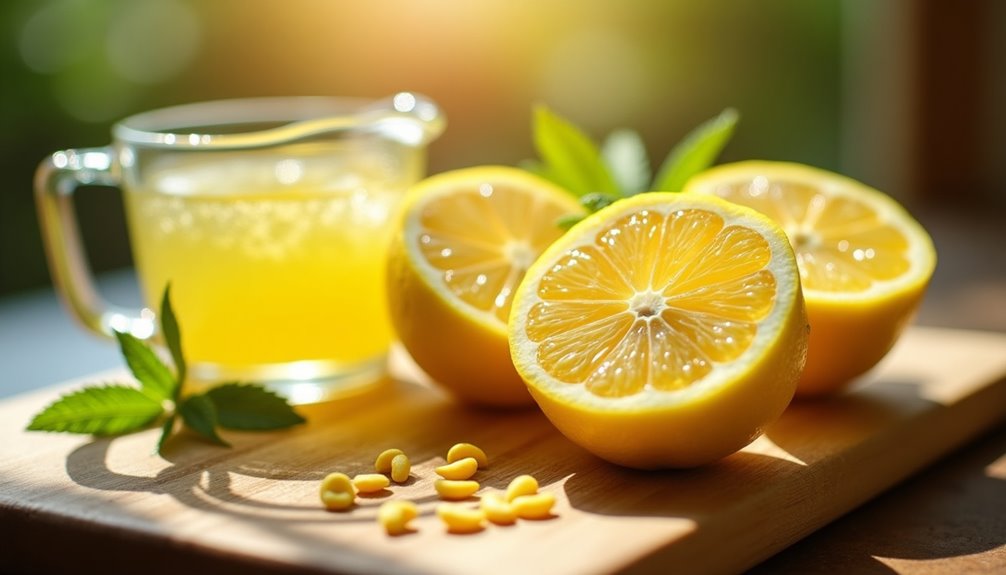
When you're cooking or baking, knowing how much lemon juice equals half a lemon can save you time and effort. This might seem like a small detail, but it can make a big difference in your recipes. Typically, half a medium lemon yields about 1.5 tablespoons of juice. If you're working with a large lemon, you can expect to get around 2 tablespoons from half of it. However, these measurements can vary depending on the size and ripeness of the lemon. So, it's a good idea to check the amount of juice you're getting to ensure your dish turns out just right.
To really maximize juice extraction, there's a simple trick you can use before cutting the lemon. Rolling it on a hard surface helps break down the internal membranes, making the juice easier to extract. This is especially helpful if you're using a medium lemon, which might yield less juice than a larger one. It's all about getting the most out of your citrus fruits.
The ripeness of the lemon also plays a crucial role; a perfectly ripe lemon will generally produce more juice than one that's under or overripe.
When you're working on a recipe that requires a specific amount of lemon juice, it's wise to have some extra lemons on hand. You wouldn't want to find yourself short on juice when you're halfway through making a delicious lemon tart or a refreshing lemonade. Having some extra lemons gives you the flexibility to adjust if you discover your half lemon didn't yield quite enough juice. This way, you can maintain the balance of flavors that makes your dish shine.
Different recipes might call for varying amounts of lemon juice, so understanding these conversions can help you plan better. For example, if a recipe requires the juice of one lemon, you now know you'll likely need one medium lemon or half of a large lemon to get the right quantity.
If you prefer a more pronounced lemon flavor, you might want to slightly overestimate and use a little more juice. Just remember that acidity can vary, so adjust according to your taste.
Frequently Asked Questions
How Much Bottled Lemon Juice Equals Half a Lemon?
When you're looking to substitute bottled lemon juice for fresh lemon, you can use about 1.5 tablespoons to replace the juice of half a medium lemon.
Just keep in mind that the flavor might differ, so start with 1 tablespoon and adjust to your taste.
Check the brand's label, too, since acidity and flavor can vary.
This way, you can get the perfect zing for your dish!
Can I Substitute Bottled Lemon Juice for Fresh Lemon Juice?
Did you know that fresh lemon juice boasts about 40% more vitamin C than bottled varieties?
You can substitute bottled lemon juice for fresh lemon juice, but be cautious. The flavor and acidity can vary greatly, so it's wise to taste as you go. Start with less and adjust to your liking.
While convenient, bottled juice may lack the vibrant taste and health benefits of fresh juice, so choose wisely!
Is 100% Lemon Juice in a Bottle the Same as a Lemon?
No, 100% lemon juice in a bottle isn't the same as a fresh lemon.
While it provides acidity, it lacks the fresh flavor and essential oils you'd get from squeezing a lemon.
Bottled juice may contain preservatives that alter the taste, making it less vibrant.
If you want the best flavor in your recipes, you should reach for fresh lemons whenever possible.
They offer a unique taste that bottled options can't replicate.
How Much Juice Does 1/2 Lemon Make?
Ever wondered how much juice you get from half a lemon?
Generally, you can expect about 1.5 tablespoons from a medium lemon. If you're using a larger lemon, that number might bump up to around 2 tablespoons.
Keep in mind, the actual yield can vary based on the lemon's size and ripeness.
If you want to get the most juice, try rolling it before cutting or give it a quick warm-up in the microwave!
Conclusion
In conclusion, if you’re wondering how much lemon juice equals half a lemon, you’ll typically need about 1 to 1. 5 tablespoons. Whether you’re crafting a refreshing drink, enhancing your favorite dish, or adding zest to a dessert, knowing this simple conversion can elevate your cooking. So, grab your juicer, squeeze that lemon, and enjoy the burst of flavor. Freshness adds brightness, acidity enhances taste, and a little lemon juice goes a long way in your culinary adventures! Moreover, if you’re curious about how much lemon juice is in a lemon, it’s good to remember that the exact amount can vary depending on the size and juiciness of the fruit. On average, a medium-sized lemon yields approximately 2 to 3 tablespoons of juice. So whether you’re experimenting with new recipes or just trying to perfect a classic dish, understanding how much lemon juice is in a lemon can help you achieve the right balance of flavors.
Cindy thoroughly researches juicing trends, techniques, and recipes to provide readers with practical advice and inspiration. Her writing style is accessible, engaging, and designed to make complex concepts easy to understand. Cindy’s dedication to promoting the advantages of juicing shines through her work, empowering readers to make positive changes in their lives through the simple act of juicing.

